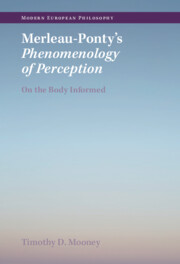Book contents
- Merleau-Ponty’s Phenomenology of Perception
- Modern European Philosophy
- Merleau-Ponty’s Phenomenology of Perception
- Copyright page
- Contents
- Acknowledgements
- Abbreviations
- Preface
- Chapter 1 Phenomenology and Objective Thought
- Chapter 2 Sensations, Associations and Explanations
- Chapter 3 Attention, Judgement and Other Work
- Chapter 4 Back to the Experience of the Body
- Chapter 5 The Body Schema and Our Skills
- Chapter 6 Motor Intentionality and Our Landscapes
- Chapter 7 Others Expressive, Engaged and Exposed
- Chapter 8 Language, Speech and Affectivity
- Chapter 9 Temporality, Subjectivity and Idealisation
- Bibliography
- Index
Chapter 2 - Sensations, Associations and Explanations
Published online by Cambridge University Press: 03 November 2022
- Merleau-Ponty’s Phenomenology of Perception
- Modern European Philosophy
- Merleau-Ponty’s Phenomenology of Perception
- Copyright page
- Contents
- Acknowledgements
- Abbreviations
- Preface
- Chapter 1 Phenomenology and Objective Thought
- Chapter 2 Sensations, Associations and Explanations
- Chapter 3 Attention, Judgement and Other Work
- Chapter 4 Back to the Experience of the Body
- Chapter 5 The Body Schema and Our Skills
- Chapter 6 Motor Intentionality and Our Landscapes
- Chapter 7 Others Expressive, Engaged and Exposed
- Chapter 8 Language, Speech and Affectivity
- Chapter 9 Temporality, Subjectivity and Idealisation
- Bibliography
- Index
Summary
I outline Merleau-Ponty’s critique of first-generation empiricism with its causal account of sensations of determinate qualities, which is rejected in favour of a figure background account that factors in our interests and our biological imperatives. I then show how he rejects a classical account of re-identification through associations based on the projection of memories. We do not associate past and present bundles of sensations, rather past and present configurations. I then run through his positive view of intersensory or intermodal perception, in which our senses work together from the outset because they are structured to do so. Finally I suggest how he would criticise the second-generation objective thought found in the contemporary physicalism that no longer posits unstructured sensations or externally related variables. He would show that our lifeworld, our responses to significant situations and our beliefs in proximate and distant action possibilities for ourselves and others are utterly ineliminable.
Keywords
- Type
- Chapter
- Information
- Merleau-Ponty's Phenomenology of PerceptionOn the Body Informed, pp. 31 - 52Publisher: Cambridge University PressPrint publication year: 2022



